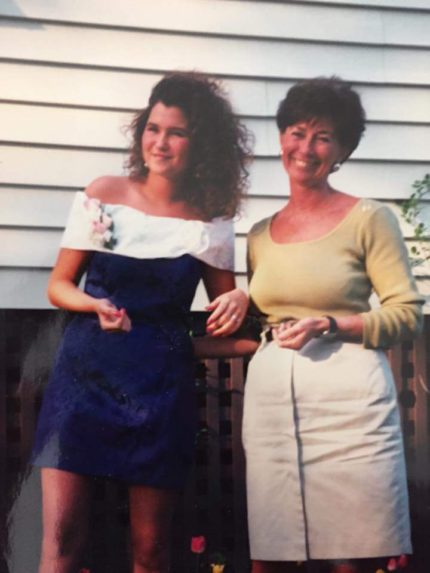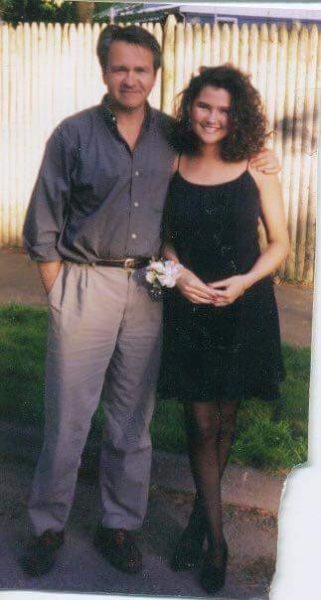Nicole Petit was diagnosed with Type 1 diabetes when she was 9-years-old. A few weeks ago, she wrote a blog post for us about what it was like growing up with diabetes. Her parents also contributed to the post because, of course, the diagnosis turned their lives upside down as well. And just when they got things figured out, Nicole became a teenager. Here’s how she managed to make it through those years and come out a strong and confident young woman.
I’d venture to say that anyone who has ever been a teenager, parented a teenager, taught or coached a teenager, knows that the teen years are a tough time for a kid. Raging hormones and peer pressure are at their peak, bodies are changing. Sometimes, parents are divorcing, and hearts are breaking. Throw a chronic illness into that mix and it’s a bomb waiting to go off.
That said, despite my parents’ worry, in a way, my having Type 1 diabetes made things easier for them when I was a teenager. I was too afraid to drink, to do drugs or to have sex. They knew I wouldn’t get into trouble typically associated with many teens.
What was tough for them was the constant worry that my sugar would drop dangerously low or that I’d run out of syringes on a field trip. They should have been more worried that as a teen I ate what I wanted when I wanted. Whenever I visited a friend’s house, I tore into their Oreo’s and consumed a sleeve in one sitting.
Forget drugs and alcohol, I wanted carbs and we hadn’t had sweets in our house since before I’d been diagnosed in 1985. On the rare occasion that we had Cheezits in our cupboard I’d polish them off before my mum got home from work. Had a friend been over, I blamed them for the empty box. Inevitably, due to this part of my lifestyle, my A1C tended to run too high (8.2 is the highest I have had).
On the flipside, when I was 17, my sugar dropped so low that when I didn’t wake up for school one morning, my mum immediately called for an ambulance. The medic injected me with glucagon, a fast acting lifesaving dose of glucose, and I recovered pretty quickly. While I was shaken, my ego was more bruised than anything since the firemen saw me in my pajamas and injected the shot into my backside.
Following this life-threatening incident, I had to admit to my parents that I was trying to lose weight for an upcoming school dance. Unbeknownst to them, I’d been living on Saltine crackers and tea for about two weeks. I was also exercising — a lot. This isn’t a safe combination for anyone, but especially not for a type 1 diabetic.
Otherwise, I was a pretty manageable teen, except when I felt I was being picked on for my illness. I had a tough time keeping my mouth shut when I was offended. This landed me in countless hours of detention and even a stint in in-house suspension.
One of the things that my parents imparted to me very early was to not only be prepared but also to not be embarrassed about my illness. And I wasn’t. I was never self-conscious about it. I never felt like a burden and frankly, didn’t care if I was. I knew plenty of kids and adults who were a lot more high maintenance than I was who didn’t even have a chronic illness. So, I decided early on to just be myself, disease and all.
I always felt safe with my family. My aunts Mary and Nancy and my grandmother made me sugar-free desserts, my cousins looked after me, and my Uncle Gene did my injections when I spent the weekend with my cousins. So when I got into the real world and was faced with questions and scolding like: “Are you sure you should eat that? It has sugar,” or “You probably got diabetes because you ate sugar cereal,” I was surprised by some peoples’ lack of sensitivity and knowledge regarding Type 1 diabetes.
While some people were well intentioned, others were plain rude. I once took an injection at a park — I certainly wasn’t going into a hot, smelly porta-potty to take a five-second injection — and a woman accused me of doing drugs. I had a teacher accuse of me of “using my diabetes as an excuse” to be late for class. Both situations pushed me to be even more open about my illness. I didn’t hide anything and started to welcome both the questions and the criticisms. I viewed both as an opportunity to educate people.
Then there was the high school problem and all of the angst which accompanies that. When I was 18 at a fancy restaurant on New Year’s Eve with my then boyfriend, I started to give my shot through my tights (in fancy dress) at the table. My boyfriend scolded, “Nic, this isn’t the kind of place to do that.” So, I reluctantly went to the bathroom, gave my injection and then broke up with him on the drive home. I wouldn’t accept that attitude.
In my college years, I was dumped more than once for refusing to have sex. I was called a prude and a goody-goody countless times. Again, I was unfazed. I certainly wasn’t going to be pressured into sex — I had bigger fish to fry. I was too afraid to get pregnant. I knew girls at school who’d been pregnant and either had a child or an abortion, and I didn’t want to risk either situation. I wasn’t an angel, but I wasn’t about to put myself at risk for any kind of medical issue on top of diabetes.
During high school and college, my endocrinologist suggested I see a therapist to “deal with my anger over diabetes.” I didn’t care much about my diabetes. I wanted a prom dress, to look stylish, go to concerts and for my parents to not get divorced.
My parents pushed me to get on the insulin pump for years. Part of me resisted everyone’s suggestions because they kept telling me to do it. One of many lessons I learned from my parents’ and doctor’s persistence, is that people do things when they’re ready – we can’t be pushed into things. As I matured, I did eventually take their good advice. I sought and still love therapy and about two years ago, I finally got on an insulin pump and the continuous glucose monitor (CGM). These are some of the best decisions I’ve made, and I made them when it felt right for me. Things got trickier from this point, but they also got a lot better. I have discovered that the two are rarely mutually exclusive.
In her final installment, Nicole will tell us what her life is like now, at age 40. If you have any questions you’d like to ask her, send me an email or use the comment box below.




Diane and Nicole, Thank you for sharing such a personal and inspiring story – as Nicole’s Uncle, I have always admired her courage, empathy, positive attitude and sensitivity. This informative blog only reinforces my abiding respect and love for her and her supportive family.
John Kerry
Hi John. I’m delighted that she is sharing her story and giving us a glimpse into her life with diabetes. She’s doing it with sensitivity, candor and a dose of humor. (Must be her Irish heritage!)